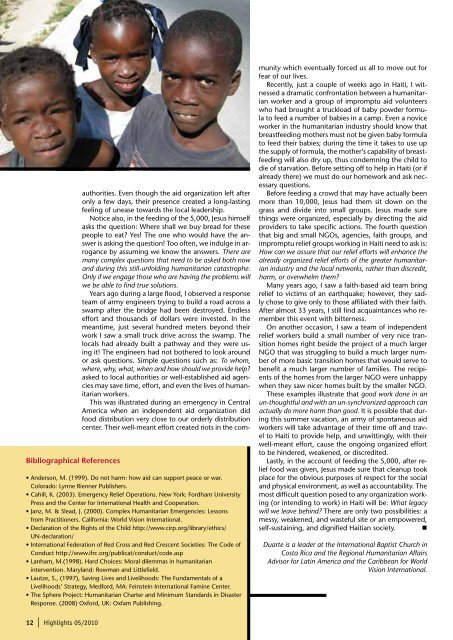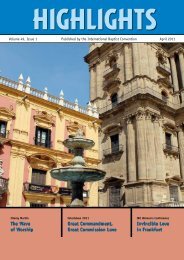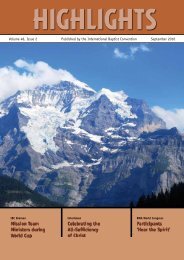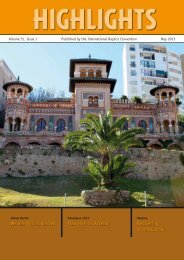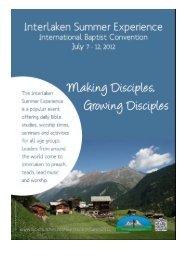Read Online Now - International Baptist Convention
Read Online Now - International Baptist Convention
Read Online Now - International Baptist Convention
You also want an ePaper? Increase the reach of your titles
YUMPU automatically turns print PDFs into web optimized ePapers that Google loves.
Bibliographical References<br />
• Anderson, M. (1999). Do not harm: how aid can support peace or war.<br />
Colorado: Lynne Rienner Publishers.<br />
• Cahill, K. (2003). Emergency Relief Operations. New York: Fordham University<br />
Press and the Center for <strong>International</strong> Health and Cooperation.<br />
• Janz, M. & Slead, J. (2000). Complex Humanitarian Emergencies: Lessons<br />
from Practitioners. California: World Vision <strong>International</strong>.<br />
• Declaration of the Rights of the Child http://www.cirp.org/library/ethics/<br />
UN-declaration/<br />
• <strong>International</strong> Federation of Red Cross and Red Crescent Societies: The Code of<br />
Conduct http://www.ifrc.org/publicat/conduct/code.asp<br />
• Lanham, M.(1998). Hard Choices: Moral dilemmas in humanitarian<br />
intervention. Maryland: Rowman and Littlefield.<br />
• Lautze, S., (1997), Saving Lives and Livelihoods: The Fundamentals of a<br />
Livelihoods’ Strategy, Medford, MA: Feinstein <strong>International</strong> Famine Center.<br />
• The Sphere Project: Humanitarian Charter and Minimum Standards in Disaster<br />
Response. (2008) Oxford, UK: Oxfam Publishing.<br />
authorities. Even though the aid organization left after<br />
only a few days, their presence created a long-lasting<br />
feeling of unease towards the local leadership.<br />
Notice also, in the feeding of the 5,000, Jesus himself<br />
asks the question: Where shall we buy bread for these<br />
people to eat? Yes! The one who would have the answer<br />
is asking the question! Too often, we indulge in arrogance<br />
by assuming we know the answers. There are<br />
many complex questions that need to be asked both now<br />
and during this still-unfolding humanitarian catastrophe.<br />
Only if we engage those who are having the problems will<br />
we be able to find true solutions.<br />
Years ago during a large flood, I observed a response<br />
team of army engineers trying to build a road across a<br />
swamp after the bridge had been destroyed. Endless<br />
effort and thousands of dollars were invested. In the<br />
meantime, just several hundred meters beyond their<br />
work I saw a small truck drive across the swamp. The<br />
locals had already built a pathway and they were using<br />
it! The engineers had not bothered to look around<br />
or ask questions. Simple questions such as: To whom,<br />
where, why, what, when and how should we provide help?<br />
asked to local authorities or well-established aid agencies<br />
may save time, effort, and even the lives of humanitarian<br />
workers.<br />
This was illustrated during an emergency in Central<br />
America when an independent aid organization did<br />
food distribution very close to our orderly distribution<br />
center. Their well-meant effort created riots in the community<br />
which eventually forced us all to move out for<br />
fear of our lives.<br />
Recently, just a couple of weeks ago in Haiti, I witnessed<br />
a dramatic confrontation between a humanitarian<br />
worker and a group of impromptu aid volunteers<br />
who had brought a truckload of baby powder formula<br />
to feed a number of babies in a camp. Even a novice<br />
worker in the humanitarian industry should know that<br />
breastfeeding mothers must not be given baby formula<br />
to feed their babies; during the time it takes to use up<br />
the supply of formula, the mother’s capability of breastfeeding<br />
will also dry up, thus condemning the child to<br />
die of starvation. Before setting off to help in Haiti (or if<br />
already there) we must do our homework and ask necessary<br />
questions.<br />
Before feeding a crowd that may have actually been<br />
more than 10,000, Jesus had them sit down on the<br />
grass and divide into small groups. Jesus made sure<br />
things were organized, especially by directing the aid<br />
providers to take specific actions. The fourth question<br />
that big and small NGOs, agencies, faith groups, and<br />
impromptu relief groups working in Haiti need to ask is:<br />
How can we assure that our relief efforts will enhance the<br />
already organized relief efforts of the greater humanitarian<br />
industry and the local networks, rather than discredit,<br />
harm, or overwhelm them?<br />
Many years ago, I saw a faith-based aid team bring<br />
relief to victims of an earthquake; however, they sadly<br />
chose to give only to those affiliated with their faith.<br />
After almost 33 years, I still find acquaintances who remember<br />
this event with bitterness.<br />
On another occasion, I saw a team of independent<br />
relief workers build a small number of very nice transition<br />
homes right beside the project of a much larger<br />
NGO that was struggling to build a much larger number<br />
of more basic transition homes that would serve to<br />
benefit a much larger number of families. The recipients<br />
of the homes from the larger NGO were unhappy<br />
when they saw nicer homes built by the smaller NGO.<br />
These examples illustrate that good work done in an<br />
un-thoughtful and with an un-synchronized approach can<br />
actually do more harm than good. It is possible that during<br />
this summer vacation, an army of spontaneous aid<br />
workers will take advantage of their time off and travel<br />
to Haiti to provide help, and unwittingly, with their<br />
well-meant effort, cause the ongoing organized effort<br />
to be hindered, weakened, or discredited.<br />
Lastly, in the account of feeding the 5,000, after relief<br />
food was given, Jesus made sure that cleanup took<br />
place for the obvious purposes of respect for the social<br />
and physical environment, as well as accountability. The<br />
most difficult question posed to any organization working<br />
(or intending to work) in Haiti will be: What legacy<br />
will we leave behind? There are only two possibilities: a<br />
messy, weakened, and wasteful site or an empowered,<br />
self-sustaining, and dignified Haitian society. •<br />
Duarte is a leader at the <strong>International</strong> <strong>Baptist</strong> Church in<br />
Costa Rica and the Regional Humanitarian Affairs<br />
Advisor for Latin America and the Caribbean for World<br />
Vision <strong>International</strong>.<br />
12 | Highlights 05/2010


